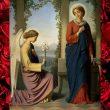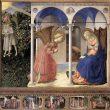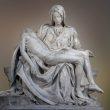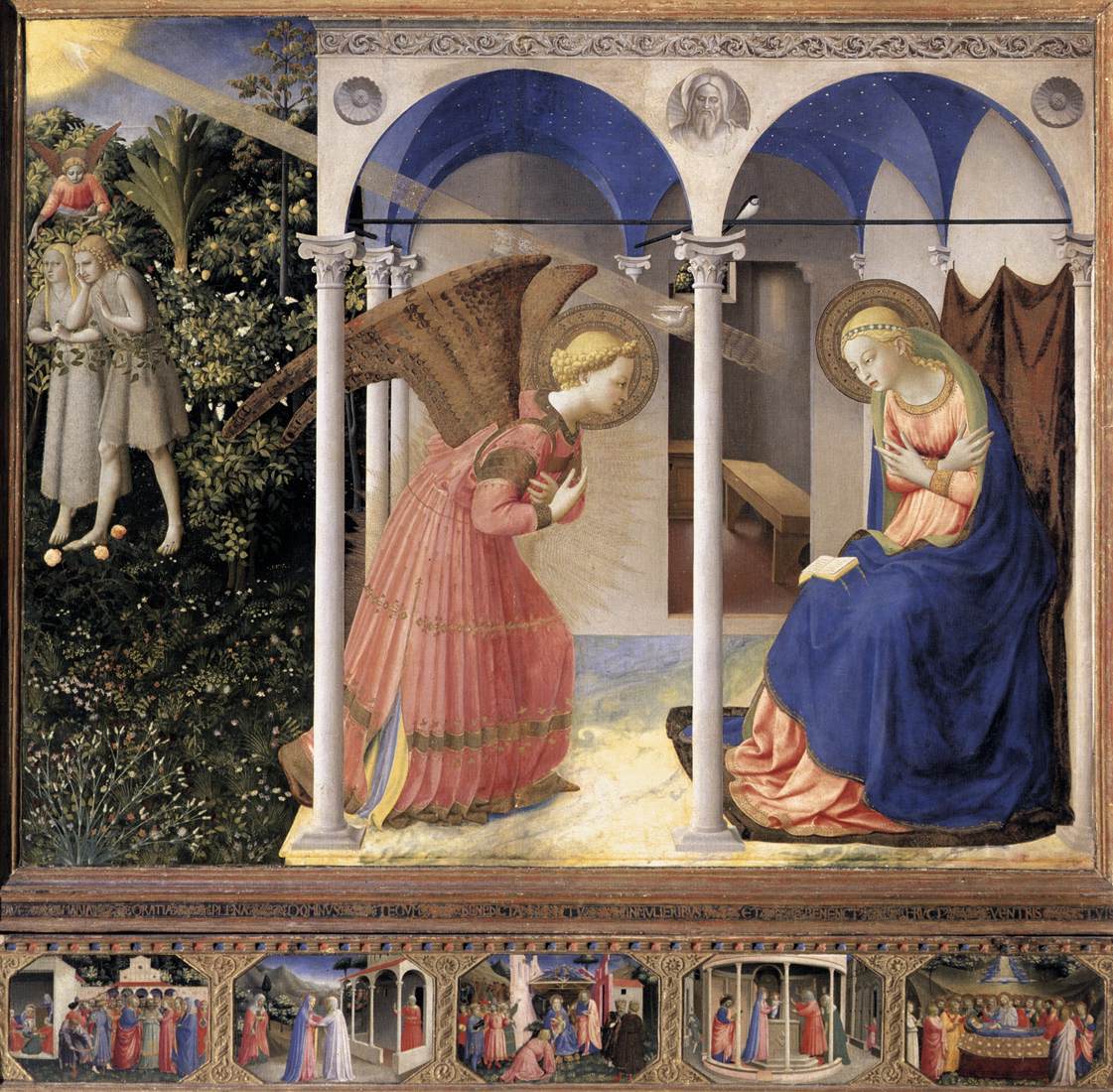A response to those who ask any of these questions:
- Are Catholics Christians?
- Are you a Christian or a Catholic?
Perhaps you have been asked this question in the past…Well, this question can be posed in another way to just anyone.
- Are you a Christian or a Lutheran?
- Are you a Christian or a Reformed?
- Are you a Christian or a Presbyterian?
- Are you a Christian or a Methodist?
Perhaps you are a Baptist, Pentecostal, Church of Christ or Nondenominational. Anyway, let’s find out who a Christian is.
Who is a Christian?
In order to answer this question very well, we need to find out who Christ was in the first place.
Who is Christ?
Jesus of Nazareth is the Christ [“Χριστός” Christos means “anointed” i.e. The Anointed One in the Biblical Greek] according to the four gospels of Matthew, Mark, Luke and John, as well as other books of the Bible.
For example:
He [Jesus] said to them, “But who do you say that I am?” Simon Peter replied, “You are the Christ, the Son of the living God.” – Matthew 16:15-16 RSV (emphasis added)
“Then he [Jesus] strictly charged the disciples to tell no one that he was the Christ.”
– Matthew 16:20 RSV (emphasis added)
Now back to the question of who a Christian is. Note: The issue, “Who is a Christian?” is a simple question with many answers and often no consensus.
The word Christian is derived from the Biblical Greek word “Χριστιανός” Christianos which means “a follower of Christ”. It is used to refer to those who followed the lifestyle and teachings of Jesus of Nazareth and have been baptized.
The earliest usage of the word “Christian” is found in the Acts of the Apostles written by St. Luke. Here the word was used to refer to followers of Jesus of Nazareth who were in Antioch. St. Luke writes:
“…and in Antioch the disciples were for the first time called Christians.” -Acts 11:26 RSV
The first Christians were the Apostles and Mary, the Mother of Jesus, as well as a number of unnamed disciples who are mentioned in the New Testament.
To many people, Christianity involves a mere belief in Christ. Citation of St. Paul’s letter to the Romans is frequently used as proof text for those who hold this position.
“because, if you confess with your lips that Jesus is Lord and believe in your heart that God raised him from the dead, you will be saved.” – Romans 10:9 RSV
Many who professed to be Christians limit the Gospel to the words of Jesus Christ as found in the third chapter of St. John’s Gospel.
“For God so loved the world that he gave his only Son, that whoever believes in him should not perish but have eternal life.” – John 3:16 RSV
On the contrary, Jesus Christ Himself does not put emphasis on faith alone. For example in the Gospel of St. Matthew, He said:
“Not every one who says to me, ‘Lord, Lord,’ shall enter the kingdom of heaven, but he who does the will of my Father who is in heaven.” – Matthew 7:21 RSV (emphasis added)
In the Gospel of St. Mark, Jesus said:
“He who believes and is baptized will be saved; but he who does not believe will be condemned.” – Mark 16:16 RSV (emphasis added)
Scripture repeatedly demonstrates that faith alone is not good enough. For example:
“So faith by itself, if it has no works, is dead.” – James 2:17 RSV
“You see that a man is justified by works and not by faith alone.” – James 2:24 RSV (emphasis added)
“And if I have prophetic powers, and understand all mysteries and all knowledge, and if I have all faith, so as to remove mountains, but have not love, I am nothing.”
– 1 Corinthians 13:2 RSV (emphasis added)
“So faith, hope, love abide, these three; but the greatest of these is love.”
– 1 Corinthians 13:13 RSV (emphasis added)
Who is a Catholic?
The word Catholic comes from the Greek adjective “καθολικός” katholikos which means “universal” which is derived from “κατά” kata meaning “according to” and “όλος” holos meaning “whole”.
Note: The word “Catholic” is used in the Apostles’, Nicene, and Athanasian creeds and many non-Catholics try to claim it for themselves by arguing that the “catholic church” is the invisible, universal brotherhood of all believers. This is unfortunately an unhistorical view that deliberately overlooks the actual use of the word at the time these creeds were written.
Ironically like the word “Christian”, the word “Catholic” also was used by a bishop of Antioch named Ignatius. In his letter written to Christians in Smyrna, He says:
“Let that be deemed a proper Eucharist, which is [administered] either by the bishop, or by one to whom he has entrusted it. Wherever the bishop shall appear, there let the multitude [of the people] also be; even as, wherever Jesus Christ is, there is the Catholic Church.” (Letter to the Smyrneans 8:2 [A.D. 110]) (emphasis added)
Other historical accounts of the use of the word “Catholic” in the early Church includes:
“And of the elect, he was one indeed, the wonderful martyr Polycarp, who in our days was an apostolic and prophetic teacher, bishop of the Catholic Church in Smyrna. For every word which came forth from his mouth was fulfilled and will be fulfilled” (Martyrdom of Polycarp 16:2 [A.D. 155]) (emphasis added)
St. Irenaeus of Lyon:
“…the Catholic Church possesses one and the same faith throughout the whole world, as we have already said.” (Against Heresies 1:10 [A.D. 189]) (emphasis added)
“The truth is to be found nowhere else but in the Catholic Church, the sole depository of apostolical doctrine. Heresies are of recent formation, and cannot trace their origin up to the apostles.” (Against Heresies 3:4 [A.D. 189]) (emphasis added)
Tertullian:
“Where was [the heretic] Marcion, that shipmaster of Pontus, the zealous student of Stoicism? Where was Valentinus, the disciple of Platonism? For it is evident that those men lived not so long ago–in the reign of Antonius for the most part–and that they at first were believers in the doctrine of the Catholic Church, in the church of Rome under the episcopate of the blessed Eleutherius, until on account of their ever restless curiosity, with which they even infected the brethren, they were more than once expelled” (Demurrer Against the Heretics 30 [A.D. 200]) (emphasis added)
St. Cyril of Jerusalem:
“And if you ever are visiting in cities, do not inquire simply where the house of the Lord is–for the others, sects of the impious, attempt to call their dens ‘houses of the Lord’–nor ask merely where the Church is, but where is the Catholic Church. For this is the name peculiar to this holy Church, the Mother of us all, which is the Spouse of our Lord Jesus Christ, the only-begotten Son of God” (Catechetical Lectures 18:26 [A.D. 350]) (emphasis added)
Now back to the question of who a Catholic is.
A Catholic is a member of the Church that traces its origin all the way back to Christ and His Holy Apostles.
Are Catholics Christians?
To answer this question let’s have a quote from St. Pacian, bishop of Barcelona.
St. Pacian:
“And shall the Fathers rather follow our authority, and the antiquity of Saints give way to be emended by us, and times now putrifying through their sins, pluck out the grey hairs of Apostolic age? And yet, my brother, be not troubled; Christian is my name, but Catholic my surname. The former gives me a name, the latter distinguishes me. By the one I am approved; by the other I am but marked.” (Epistle to Sympronian 7 [A.D. 375]) (emphasis added)
YES! Catholics are Christians. Surprised?
Note: Whether or not someone agrees with Catholic doctrine is their choice. But all who look at history critically will admit that Catholics are the original Christians.
Let’s see…
“…and no one can say “Jesus is Lord” except by the Holy Spirit.” 1 Corinthians 12:3 RSV
The highly respected Pharisee teacher Gama’li-el once commented that any religious body which is not of God will not stand the test of time. (cf. Acts 5:34-40) This is very true! Many of the un-Christian heretical groups came and left. For example:
Docetism (first century): This heresy denied Jesus’ humanity.
Marcionism (second century): This heresy denied the Old Testament’s validity.
Monarchianism (second century): This heresy held that Jesus was a human being who, at some point, perhaps at his baptism in the Jordan, received divine power from God.
Subordinationism (second century): This heresy held that Jesus was viewed as not being co-equal with the Father.
Novatianism (third century): This heresy held that serious sinners could not be readmitted into the Church.
Arianism (fourth century): This heresy denied Jesus’ divinity and the Trinity.
Pneumatomachism (fourth century): This heresy denied the divinity of the Holy Spirit and therefore of the Trinity.
Monophysitism (fifth century): This heresy claimed that Christ had only one nature.
Pelagianism (fifth century): This heresy denied the existence of “original sin,” and believed that one could obtain salvation by works without grace or the Church.
Monothelitism (seventh century): This heresy denied that Christ had a human will and a divine will.
Iconaclasm (eighth and ninth century): This heresy was led by the emperors that argued that icons fostered idolatry.
Catharianism (eleventh century): They renounced baptism and marriage. They viewed the body and matter as evil.
For over 1000 years there was only the Catholic Church. In the year 1054, a schism occurred in the Church and the eastern part of the Church split off. They are known today as the Eastern Orthodox Church.
In the 1500s some Catholics decided to break off from the Catholic Church and start their own churches in what is known as the Protestant Reformation.
The Catholic Church is the single tree every other Christian denomination has broken off from, each taking a truth with it, but leaving a little behind every time another branch breaks off.
The Catholic Church protected Christianity from the Arian heresy and defined the Trinity.
The Catholic Church chose which books to include in the Bible and coined the word Bible [“βυβλος” Byblos meaning “papyrus” i.e. paper] which is not found in the Bible itself.
Martin Luther, the founder of Protestantism acknowledges this:
“We are obliged to yield many things to the Papists [Catholics] —that they possess the Word of God which we received from them, otherwise we should have known nothing at all about it” (Commentary on St. John, 16).
Copyright © Godwin Delali Adadzie. All rights reserved.




